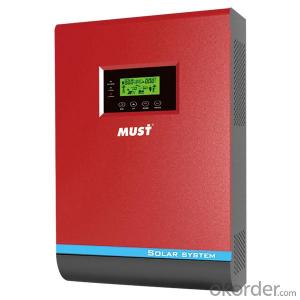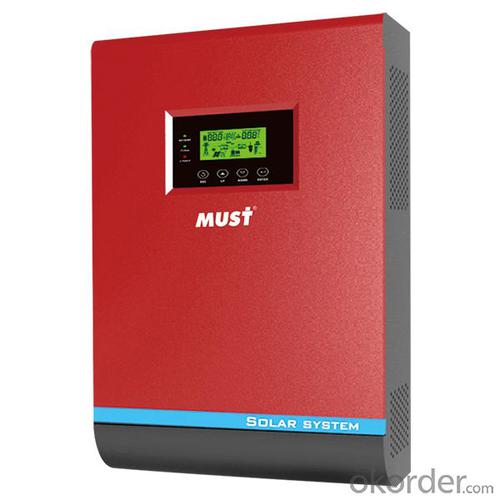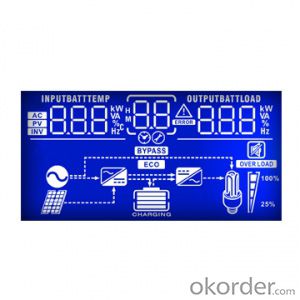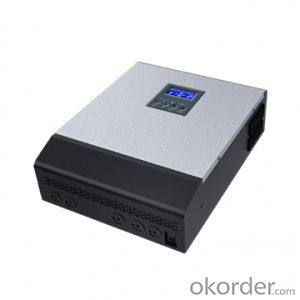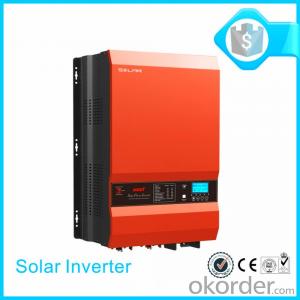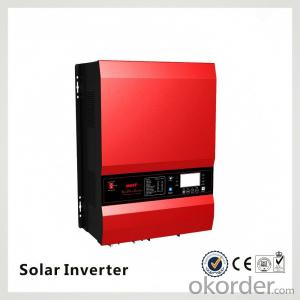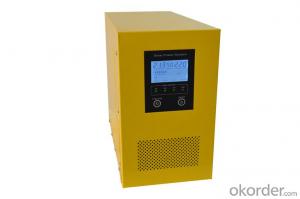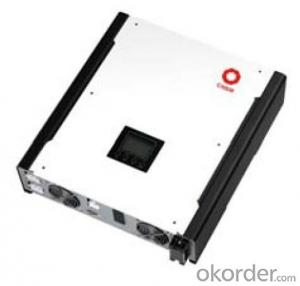1440W Solar Inverter Charge Controller Hybrid Inverter Excellent Quality 2000VA with Competitive Price
- Loading Port:
- China main port
- Payment Terms:
- TT OR LC
- Min Order Qty:
- 10 pc
- Supply Capability:
- 1000 pc/month
OKorder Service Pledge
OKorder Financial Service
You Might Also Like
Features:
. Pure sine wave inverter
. Selectable input voltage range for home appliances and personal computers
. Selectable charging current based on applications
. Configurable AC/Solar input priority via LCD setting
. Compatible to mains voltage or generator power
. Parallel operation with up to 4 units only available for PV200 4KVA/5KVA
. Auto restart while AC is recovering
. Overload and short circuit protection
. Smart battery charger design for optimized battery performance
. Cold start function
| Model | PV1800-1KVA | PV1800-2KVA | PV1800-3KVA | PV1800-4KVA | PV1800-5KVA |
| RATED POWER | 1000VA / 800W | 2000VA/ 1600W | 3000VA / 2400W | 4000VA / 3200W | 5000VA / 4000W |
| INPUT | |||||
| Voltage | 230 VAC | ||||
| Selectable Voltage Range | 170-280 VAC (For Personal Computers) ; 90-280 VAC (For Home Appliances) | ||||
| Frequency Range | 50 Hz/60 Hz (Auto sensing) | ||||
| OUTPUT | |||||
| AC Voltage Regulation (Batt. Mode) | 230 VAC ± 5% | ||||
| Surge Power | 2000VA | 4000VA | 6000VA | 8000VA | 10000VA |
| Efficiency (Peak) | 90% | 93% | |||
| Transfer Time | 10 ms (For Personal Computers) ; 20 ms (For Home Appliances) | ||||
| Waveform | Pure sine wave | ||||
| BATTERY | |||||
| Battery Voltage | 12 VDC | 24 VDC | 48 VDC | ||
| Floating Charge Voltage | 13.5 VDC | 27 VDC | 54 VDC | ||
| Overcharge Protection | 15 VDC | 30 VDC | 60 VDC | ||
| Maximum Charge Current | 10 A or 20 A | 20 A or 30 A | 20 A or 30 A | ||
| SOLAR CHARGER (OPTION) | |||||
| Charging Current | 50 A | ||||
| Maximum PV Array Open Circuit Voltage | 30 VDC | 60 VDC | 90 VDC | ||
| Standby power Consumption | 1 W | 2 W | 2 W | ||
| PHYSICAL | |||||
| Dimension, D x W x H (mm) | 95 x 240 x 316 | 100 x 272 x 355 | 120 x 295 x 468 | ||
| Net Weight (kgs) | 5.0 | 6.4 | 6.9 | 9.8 | 9.8 |
| OPERATING ENVIRONMENT | |||||
| Humidity | 5% to 95% Relative Humidity(Non-condensing) | ||||
| Operating Temperature | 0°C - 55°C | ||||
| Storage Temperature | -15°C - 60°C | ||||
Warranty
provides a 1~3 year limited warranty (“Warranty”) against defects in materials and workmanship for its Uninterruptible power supply, Power inverter/chargers, Solar charge controllers, Battery Products (“Product”).
The term of this Warranty begins on the Product(s) initial purchase date, or the date of receipt of the Product(s) by the end user, whichever is later. This must be indicated on the invoice, bill of sale, and/or warranty registration card submitted to MUST-Solar. This Warranty applies to the original MUST-Solar Product purchaser, and is transferable only if the Product remains installed in the original use location.
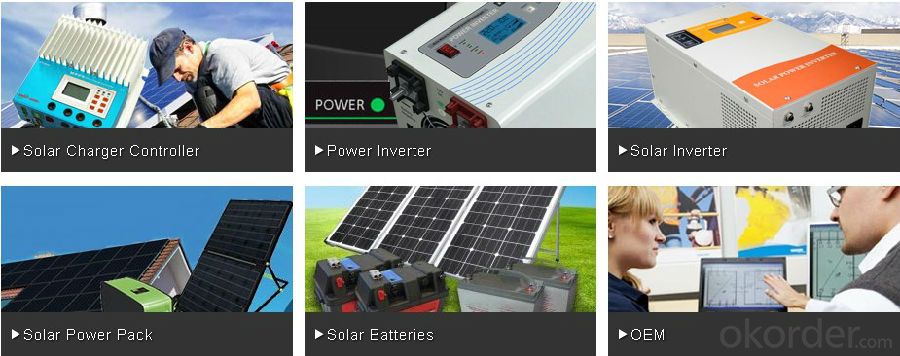
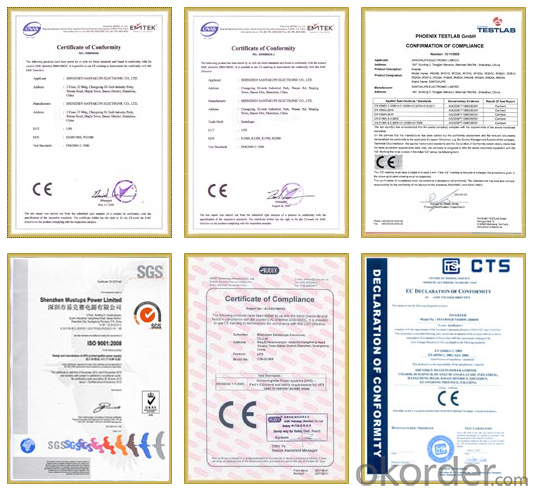
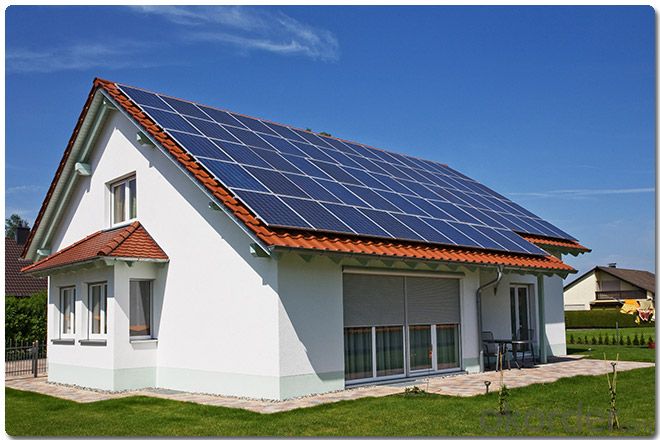
FAQ
1. How fast will my system respond to a power outage?
Our solar inverters typically transfer to battery power in less than 16 milliseconds (less than 1/50th of a second).
2. What kind of batteries do the systems include?
Our solar backup electric systems use special high-quality electric storage batteries.
3. How do I install my system?
A solar backup inverter is connected to a home electric system , we will supply detailed installation manual and videos for our customers .
- Q: What is the role of a solar inverter in maximizing solar panel output?
- The role of a solar inverter in maximizing solar panel output is to convert the direct current (DC) electricity generated by the solar panels into alternating current (AC) electricity that can be used in our homes and businesses. Additionally, the inverter ensures that the solar panels operate at their maximum power point, optimizing their efficiency and output. It also monitors and controls the flow of electricity, ensuring safety and preventing any damage to the solar panels or the electrical system.
- Q: Can a solar inverter be used with a smart home automation system?
- Certainly! A smart home automation system can indeed work together with a solar inverter. Nowadays, many solar inverters come with communication capabilities built-in, like Wi-Fi or Ethernet connectivity. This means that they can easily be integrated into a smart home automation system. This integration allows homeowners to remotely monitor and control their solar power production and usage using a smartphone app or a central control panel. By having a smart home automation system, users can keep track of real-time energy generation, make adjustments to settings, and receive notifications about system performance or any potential issues. This integration not only enhances the convenience and efficiency of managing solar power but also enables better optimization and synchronization with other smart devices and appliances in the household.
- Q: Can a solar inverter be used in a net metering system?
- Yes, a solar inverter can be used in a net metering system. A solar inverter is an essential component of a net metering system as it converts the direct current (DC) produced by the solar panels into alternating current (AC) that can be used to power homes or businesses. It also allows for any excess electricity generated to be fed back into the grid, earning credits or reducing the electricity bill through the net metering arrangement.
- Q: How does a solar inverter handle voltage drop in long cable runs?
- A solar inverter compensates for voltage drop in long cable runs by boosting the voltage to ensure efficient power transmission.
- Q: How does a solar inverter handle reactive power compensation?
- A solar inverter handles reactive power compensation by using advanced control algorithms and capacitors. It actively measures the reactive power in the system and generates the necessary reactive power to balance it out. This helps stabilize the voltage and ensures efficient energy transfer between the solar panels and the grid.
- Q: How does a solar inverter affect the overall system reliability in harsh environments?
- A solar inverter plays a crucial role in enhancing the overall system reliability in harsh environments. It acts as a bridge between the solar panels and the electrical grid, converting the DC power generated by the panels into AC power for use in various applications. In harsh environments characterized by extreme temperatures, high humidity, dust, or corrosive elements, the solar inverter's design and build quality become critical factors. A well-designed solar inverter with robust construction and advanced protective features can withstand these harsh conditions, ensuring reliable and uninterrupted power generation. Additionally, some inverters come with advanced monitoring systems that allow for real-time performance analysis and preventive maintenance, further enhancing the system's reliability in harsh environments.
- Q: Can a solar inverter be used with a hybrid solar power system?
- Yes, a solar inverter can be used with a hybrid solar power system. A hybrid solar power system typically consists of both solar panels and a secondary power source, such as batteries or a diesel generator. The solar inverter converts the direct current (DC) power generated by the solar panels into alternating current (AC) power that can be used to power appliances and devices in the home or business. Additionally, the solar inverter can also manage the flow of power between the solar panels, the batteries, and the grid, optimizing energy usage and ensuring a reliable power supply.
- Q: What is the role of a solar inverter in a solar-powered remote monitoring system?
- The role of a solar inverter in a solar-powered remote monitoring system is to convert the direct current (DC) electricity generated by the solar panels into alternating current (AC) electricity that can be used to power the monitoring system. It also ensures that the electricity generated matches the requirements of the monitoring equipment, regulates the voltage, and assists in efficient power transmission and distribution.
- Q: What is the role of maximum power control in a solar inverter?
- The role of maximum power control in a solar inverter is to optimize the power output of the photovoltaic (PV) system by continuously tracking the maximum power point (MPP) of the solar panels. This control mechanism ensures that the inverter extracts the maximum amount of energy from the PV array, despite variations in solar irradiation and temperature. By constantly adjusting the inverter's operating conditions to match the MPP, maximum power control maximizes the overall efficiency and performance of the solar power system.
- Q: Can a solar inverter be used with different types of grounding materials?
- Yes, a solar inverter can be used with different types of grounding materials. Solar inverters are designed to be compatible with various grounding systems, such as ground rods, ground plates, and grounding grids. The choice of grounding material may depend on local regulations, soil conditions, and the specific requirements of the solar installation. However, it is important to ensure that the chosen grounding material meets the safety standards and provides proper electrical grounding for the solar system.
Send your message to us
1440W Solar Inverter Charge Controller Hybrid Inverter Excellent Quality 2000VA with Competitive Price
- Loading Port:
- China main port
- Payment Terms:
- TT OR LC
- Min Order Qty:
- 10 pc
- Supply Capability:
- 1000 pc/month
OKorder Service Pledge
OKorder Financial Service
Similar products
Hot products
Hot Searches
Related keywords
